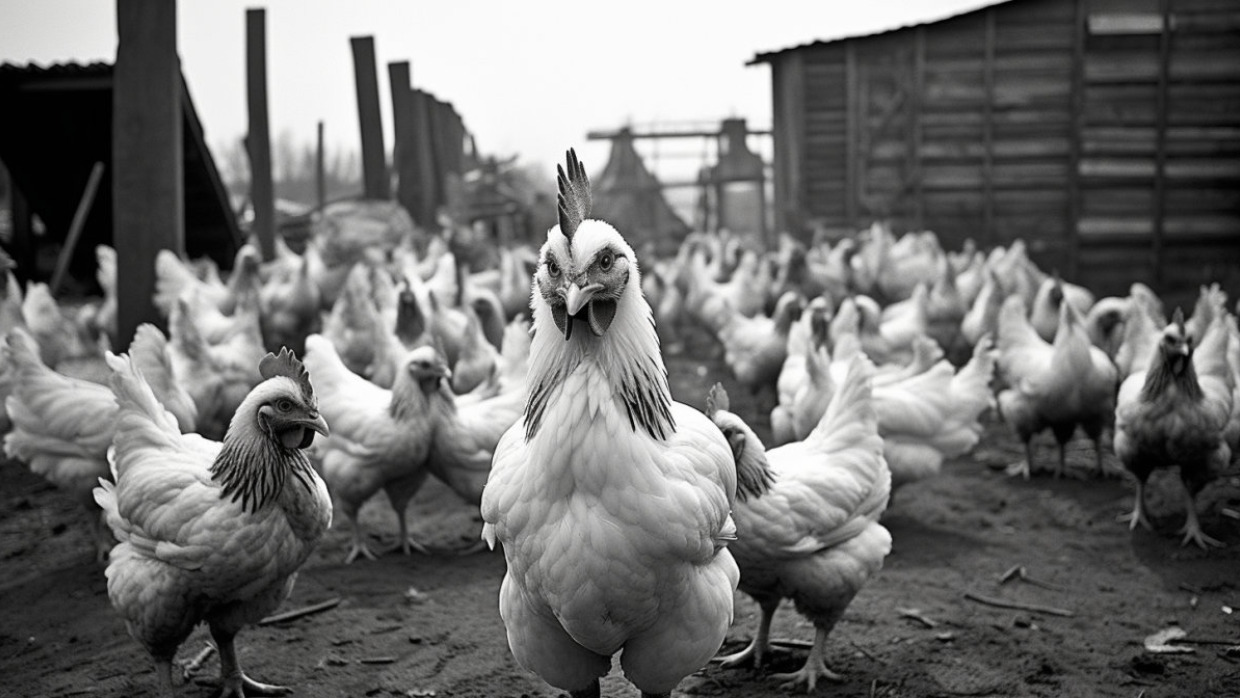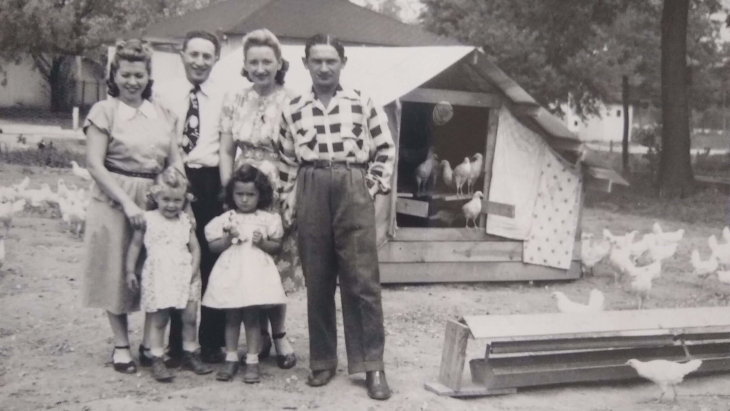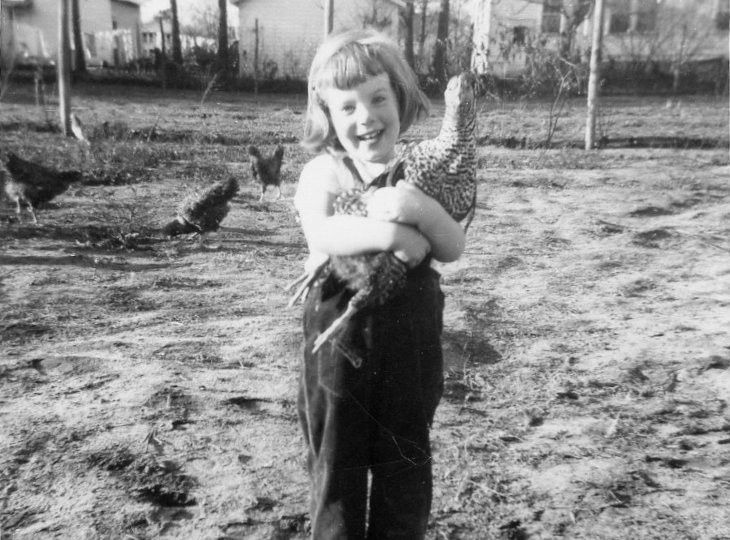 An Open Letter to University Presidents
An Open Letter to University Presidents


6 min read
Why Holocaust survivors flocked to chicken farms after the war.
Chicken farming?
That may not sound like a career for a nice Jewish boy or girl, yet for a mid-century moment, Jewish chicken farmers – many of them Holocaust survivors – helped transform Southern New Jersey into a poultry and egg powerhouse. During their peak years one out of every five eggs consumed in New York City, the world's largest city, came from their farms.
How did they do it? Through hard work, grit, and good luck, which quickly soured.
“Most were completely inexperienced,” says Seth Stern, a grandson of these farmers and author of “Speaking Yiddish to Chickens.” The title isn’t a joke. Survivors chose this work because it didn’t demand English fluency.
“The chickens didn’t care if you spoke Yiddish to them,” Stern explained in an Aish.com interview.
 Two families on the Vineland, New Jersey-area poultry farm they jointly purchased in 1947.
Two families on the Vineland, New Jersey-area poultry farm they jointly purchased in 1947.
Answering ads in the Yiddish press, these former concentration camp inmates flocked to the farming communities around Vineland. Some, like Stern’s grandfather Nuchim, a former partisan, decided that farming was the answer to their dreams.
Their exact numbers are unclear.
A Jewish Agricultural Society survey from those years estimated. that “as many as 10 percent of Jewish displaced persons relocated to these farms; Stern believes that the actual number is closer to 3,000 or roughly 2 percent of the 140,000 displaced persons who landed in the US between 1946 and 1954. In absolute terms that is miniscule but proportionally, it was double the number of Jews who farmed nationwide during that time.
After the nightmare of the war years many sought a quiet rural life, the chance to be self-employed and live in a community of people like them. For some, that dream came true at least for a while.
“On Orchard Road and similar streets around Vineland, these survivors found a new sense of security on their own land and a measure of comfort being surrounded by neighbors who had experienced similar horrors,” writes Stern.
Yet farm life could also be brutal. “It was hard physical work,” said Stern. “The coops smelled bad you had to wake up early and work seven days a week and there were no vacations.”
Yet the long hours may have had a therapeutic quality. “In the context of farming, worrying about chickens left less time to dwell on what they lost and how they suffered,” writes Stern.
When the federal government dropped price subsidies for eggs, turning a profit became increasingly difficult. That, along with the emergence of factory-sized poultry farms which produced eggs by the millions, brought about a collapse in South Jersey’s poultry farming economy.
 Author Seth Stern
Author Seth Stern
By the1960s, most of the survivors had given up on chicken farming. Looking back, says Stern, their failure seemed inevitable. “They started with debt,” he observes.
To purchase their farms the survivor farmers took loans from the Jewish Agricultural Society and the Hebrew Immigrant Aid Society and often from family and friends as well. Some of their farms carried multiple mortgages.
When egg prices dropped the farmers could no longer pay back their debts. Many declared bankruptcies. Others abandoned their farms, running away after dark. “Farmers would pack up the night and leave the farm with the lights and television so no one would know they had fled,” writes Stern. A few were so despondent that they took their own lives.
“Survivors weren’t a monolith,” says Stern. While some experienced farm life as a nightmare, for others the years on the farm were a golden period. Stern’s grandmother Bronia shared warm memories of her nearly two decades in Vineland. “All our friends were survivors,” she recalled. “And we were like family.”

In its postwar heyday, Vineland boasted a robust Jewish community with several kosher delis, butchers and bakers mutual aid societies, synagogues, and even a day school with over 150 students that ran from kindergarten to the eighth grade.
The survivors were the backbone of the community their kids growing up in what Stern called a “survivors bubble,” in which they assumed that all adults had been in what they came to call “the war.”
“Rather than playing cowboys and Indians, they pretended to be German and American soldiers,” writes Stern. No one wanted to be Germans so they had to take turns.

Stern movingly describes Vineland's tiny synagogue, founded by Chaim Lindenblatt a middle-aged survivor whose first wife and three children were murdered by the Nazis.
After his liberation from Buchenwald, Lindenblatt returned to his native Poland to retrieve his father’s Torah scroll which he’d buried in the woods for safekeeping.
Eventually, he remarried and purchased a farm near Vineland, where he built a small shul with his own hands, using the little money he earned to purchase prayer shawls and candies for the worshippers and their children. For Lindenblatt, a former rabbinical student, religion was “life itself,” wrote Stern.
“Speaking Yiddish to Chickens” was Stern’s passion project. He started it in 1999 when he was at home studying for law school finals.
“I was listening to Tuesdays with Morrie on my Walkman,” he recalls “and I got the idea that I should do the same with my grandmother.” Over deli lunches, Stern coaxed her to share stories of her past.
In the coming years, Stern would visit his grandmother’s hometown of Lublin, the Belzec concentration camp where much of her family had been murdered, and the town of Bensheim in Germany, where she and Stern’s grandfather Nuchim lived in displaced persons camps.

He also traveled to Vineland, where they had their chicken farm. Stern dove into local history, visiting archives and interviewing survivors and survivors' children, many of whom showed interest in the project.
“When I finished, my son was seven years old. He didn’t meet my grandmother. He didn’t have a sense of what she was like and what she experienced,” Stern said.
As much as he admires them his grandparents, Stern, who works as a legal journalist for Bloomberg, has no desire to attempt chicken farming.
In his mind, their legacy is to be found in their resilience and their community building.
“I hope I can convey what they built there. It was unbelievable to have experienced what they did and come to a new country, adopt a new way of life, and create connections.”

I, too grew up on a chicken farm, but in Toms River, NJ.
Yes, it was a hard life, seven days a week and no vacations.
But..you were your own boss, had lots of fresh air and open space and there was a whole communtiy of farmers to complain to. Many spoke German, not Yiddish.
I do not believe any children from the farmers remain on farms. They all excelled in school and when on to become professionals.
This was a very short lived era in by-gone times.
I feel quite unique because of the times and experience.
I grew up in Vineland NJ in the 50’s and 60’s. My dad was an insurance adjustor. I would visit these farms when there was a claim. Many times we would visit several a day after a hurricane. I saw many a destroyed chicken coop from hurricanes. It was great to live in a town that was one third Jewish. I remember well a kosher bakery called Liss Bakery on Landis Avenue.
Chickens are incredibly social and inquisitive. Chickens would have understood Yiddish speakers better than humans who did not know Yiddish. Animals understand humans much better than humans understand animals. This article leaves one longing for a lost world.
my husband was Rabbi of Garden Jewish Center of Flushing .N.Y Queens Thru a member of ours Freida and Gus Berger they put Mr Schwartz from Vine land in touch with us and for many years he brought his chickens every week to our members and developed a wonderful business He was a wonderful human being and we ere glad to help him
The comment that a number of people got wealthy is interesting. As a 2G who lived in one of the little Vineland burbs (Norma, Bridgetown, Millville, Newfield etc), my experience is that many farmers had to have another source of income to help with costs. And most did lose money in the end. The time on the farms was a blip in their return to life after the horrors of war, whether in the camps or the gulag or with the partisans. True the hope for a peaceful existence was part of the lure but the farmers did learn English. They did not remain strictly Yiddish speakers. After all many had learned languages as the war progressed and through their travels and travails.
It is not mentioned here but eventually the state bought a lot of the farms and built Route 9 on their property. I know someone who became quite wealthy from the sale, and lived comfortably for the rest of his life.
It was a nice ending to all their suffering.
Helen An amzing story. I am so happy to have read this, and so added to my knowledge regarding my people. Thanks for this, and Shana Tova to all